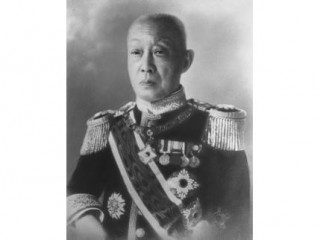
Kimmochi Saionji biography
Date of birth : 1849-10-23
Date of death : 1940-11-24
Birthplace : Kyoto, Japan
Nationality : Japanese
Category : Historian personalities
Last modified : 2011-09-01
Credited as : Politician, statesman, former Prime Minister of Japan
Kimmochi Saionji was the last elder statesman of Japan, born on Oct. 23, 1849, the second son of Kinzumi Tokudaiji, Kimmochi was adopted at the age of 2 by the Saionji family, who were court nobles (kuge) close to the imperial family. He served Emperor Komei as boy chamberlain and imperial guard and knew Mutsuhito as prince. When the latter became the Meiji emperor, Saionji at 19 was made a councilor (sanyo) and later was appointed a commander, assisted by Aritomo Yamagata, 10 years his senior.
After 10 years in France, imbibing liberal ideas, Saionji returned home in 1881 and was happy to find the Freedom and People's Rights movement in progress. He consented to head the Toyo Jiyu Shimbun (Oriental Liberal Newspaper) but was quickly ordered by the Emperor to step down.
In 1882 Saionji accompanied Hirobumi Ito to Europe on his constitutional research mission and later spent 6 years as minister to Austria-Hungary, Germany, and Belgium. Returning home, Saionji became president of the Bureau of Decorations, then vice president of the House of Peers, and, when he was 46, during the Sino-Japanese War, minister of education in the second Ito Cabinet. It was thus natural for Saionji to assist Ito in founding the Seiyukai party in 1900 and later, after a turn at the presidency of the Privy Council, to follow Ito as party president. This in turn led to two premierships alternating with those of Taro Katsura, Yamagata's protege. Yet on Yamagata's recommendation Saionji became genro in 1916 and was appointed chief delegate to the Paris Peace Conference in 1919, where he took part in founding the League of Nations. For this he was raised from marquis to prince.
With the death of Masayoshi Matsukata in 1924, Saionji became the only living genro and thus the ultimate "Cabinet maker." Although he was partial to the idea of a Cabinet based on a majority party, he could not find statesmen of real stature to choose from. This he blamed on the poor quality of the parties and the low level of the people's political understanding. As pressure from the military and support for aggression grew, Saionji lost confidence and considered resigning.
Fearing that civilians would be assassinated, Saionji recommended military men as premiers. In 1937 Saionji mistakenly thought that he had found an ideal premier in Prince Fumimaro Konoe, who could control the military. Saionji died on Nov. 24, 1940, still faintly hoping Japan could negotiate with Chiang Kai-shek and avoid war with the United States. Theoretically a bachelor, Saionji had three common-law wives and successive mistresses; he adopted a son who married his eldest daughter and became his heir, Hachiro Saionji. Saionji also distinguished himself as an author, a translator, and a musician on the biwa.
A scholarly study, Prince Saionji (trans. 1933), was written by Yosaburo Takekoshi, a noted Japanese historian. A fascinating fictionalized biography published before Saionji's death is Bunji Omura, The Last Genro: Prince Saionji, the Man Who Westernized Japan (1938), which contains glossaries. Although generally accurate and offering much background and personal detail, Omura did not have available the great amount of material that has since been published in Japanese by persons who knew Saionji personally. They include Sakutaro Koizumi, who edited Saionji's autobiography in 1949, and Kumao Harada, his personal secretary and official spokesman, who published a nine-volume work on him between 1950 and 1956, volume 1 of which, Fragile Victory: Prince Saionji and the 1930 London Treaty Issue (trans. 1968), is introduced and annotated by the translator, Thomas Francis Mayer-Oakes.
















